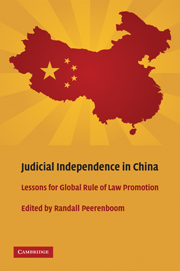Book contents
- Frontmatter
- Contents
- Contributors
- 1 Introduction
- 2 Halfway Home and a Long Way to Go
- 3 A New Approach for Promoting Judicial Independence
- 4 The Party and the Courts
- 5 Judicial Independence in China
- 6 A New Analytic Framework for Understanding and Promoting Judicial Independence in China
- 7 Judicial Independence and the Company Law in the Shanghai Courts
- 8 Local Courts in Western China
- 9 The Judiciary Pushes Back
- 10 Corruption in China's Courts
- 11 A Survey of Commercial Litigation in Shanghai Courts
- 12 Judicial Independence in Authoritarian Regimes
- 13 Judicial Independence in East Asia
- Index
- References
2 - Halfway Home and a Long Way to Go
China's Rule of Law Evolution and the Global Road to Judicial Independence, Judicial Impartiality, and Judicial Integrity
Published online by Cambridge University Press: 05 June 2012
- Frontmatter
- Contents
- Contributors
- 1 Introduction
- 2 Halfway Home and a Long Way to Go
- 3 A New Approach for Promoting Judicial Independence
- 4 The Party and the Courts
- 5 Judicial Independence in China
- 6 A New Analytic Framework for Understanding and Promoting Judicial Independence in China
- 7 Judicial Independence and the Company Law in the Shanghai Courts
- 8 Local Courts in Western China
- 9 The Judiciary Pushes Back
- 10 Corruption in China's Courts
- 11 A Survey of Commercial Litigation in Shanghai Courts
- 12 Judicial Independence in Authoritarian Regimes
- 13 Judicial Independence in East Asia
- Index
- References
Summary
This chapter focuses on an important issue under intense debate within many circles in China – the independence, impartiality, and integrity of the judiciary. The outcome of this debate has significant implications for China's future, for international judicial cooperation on a range of fronts, and for globalizing the rule of law in the developing world, where China has an ever-growing interest and influence.
China will not likely make the historic cultural, social, and legal transformation from the rule of man to the rule of law or realize her full economic and political potential over the long term without enhancing the independence, impartiality, integrity, and capacity of the judiciary. Global experience demonstrates that an independent judiciary is central to rule of law, and that it serves a number of important mutually supportive purposes, including: (i) safeguarding and enforcing people's property rights and human rights; (ii) resolving economic and political disputes; (iii) promoting international judicial cooperation fairly and predictably; (iv) addressing, mitigating, and preventing judicial and governmental corruption; (v) promoting social justice and social harmony; and (vi) promoting national and international political legitimacy. Because there are other institutional mechanisms in some countries that perform some of these essential tasks, particularly at the local and informal levels, most developing countries today are trying to create an independent judiciary with integrity as one of their long-term objectives. China is no exception.
- Type
- Chapter
- Information
- Judicial Independence in ChinaLessons for Global Rule of Law Promotion, pp. 23 - 36Publisher: Cambridge University PressPrint publication year: 2009
References
- 3
- Cited by

